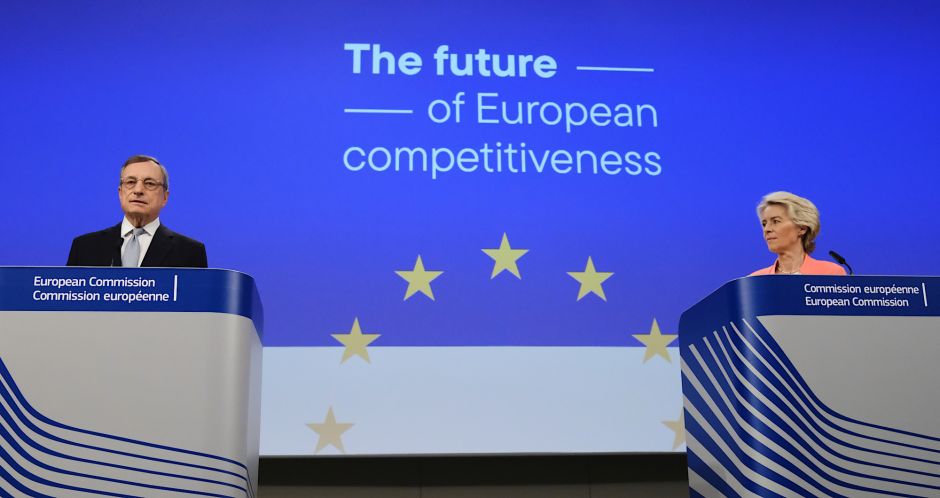More innovation and massive investments are needed to save Europe's economies

Increase the pace of innovation, lower energy prices, and strengthen the EU's independence and security. This is the message in Mario Draghi's report on how the EU should strengthen its global competitiveness. Shipping is one of the sectors that must be strengthened if the EU is to maintain its competitiveness against the USA and China.
800 billion euro per year. That's how much the EU needs to invest to meet competition from the USA and China, noted the former head of the European Central Bank, Mario Draghi, when he handed over his competitiveness report to the President of the European Commission, Ursula von der Leyen, at a press conference in Brussels on Monday.
"For the first time since the Cold War we must genuinely fear for our self-preservation," he continued.
It is clear that the EU has lost global competitiveness, and in his report, Mario Draghi identifies three main areas to drive growth: the EU must catch up in terms of innovation, climate goals and competitiveness must work together, and security and independence need to be strengthened. To achieve this, Draghi proposes significantly larger investments in financing researchers and entrepreneurs, faster decision-making, simplified regulations, and deeper cooperation between EU countries, particularly regarding strategic plans and initiatives.
Regarding shipping, the report emphasizes that the sector is crucial for Europe's energy, food, and supply chain security, especially in times of geopolitical uncertainty. This is fully in line with the arguments previously raised by the Swedish shipping sector to encourage the Swedish government to invest more in maritime research and innovation. The report also highlights, just as the Swedish shipping sector has done on a national level, that the European shipping sector is strong but losing competitiveness and risks falling further behind.
According to the report, shipping, along with aviation, are the sectors that are most difficult to transition to fossil-free operations, and extensive investments in green fuels and new technologies are required. The costs for shipping are estimated to amount to around 40 billion euro each year from 2031 to 2050. The report, therefore, underscores the need for adequate financing, which includes special calls for shipping from the EU's Innovation Fund connected to the EU ETS.
The green and digital transitions also require skill development and retraining. The report estimates that up to 250,000 seafarers in the EU may be affected in the coming years, while 800,000 seafarers will be impacted globally.
The report further points out that there is a significant lack of multimodal solutions, which discourages logistics operators from combining different modes of transport. A multimodal passenger market essentially does not exist either.
Europe must also keep pace with AI development, which will enable increasingly automated functions to deliver safety and quality, navigation, and route optimization, and contribute to reducing fuel or power consumption.
The report also calls for increased digitization. For example, the procedures for ships calling at EU ports (two million port calls per year) are cumbersome. They are either paper-based or rely on privately-owned and not always compatible IT systems and solutions, which complicates cooperation with authorities and between companies.
-
 Ny studie: Eldrivna pendelbåtar kan effektivisera Stockholms kollektivtrafik
Ny studie: Eldrivna pendelbåtar kan effektivisera Stockholms kollektivtrafik -
 EU: Sjöfartens utsläpp ökar
EU: Sjöfartens utsläpp ökar -
 Sociala relationer påverkar val av bränsle
Sociala relationer påverkar val av bränsle -
 Sjöfartens omställning kräver ”mjukare” påtryckningar
Sjöfartens omställning kräver ”mjukare” påtryckningar -
 Hon hade avtalad tid med Kapten ynkrygg
Hon hade avtalad tid med Kapten ynkrygg -
 Lighthouse omvärldsanalys 2025 – osäkerhet och tullar präglar sjöfarten
Lighthouse omvärldsanalys 2025 – osäkerhet och tullar präglar sjöfarten -
 Se seminariet Shipping in the Marine Environment
Se seminariet Shipping in the Marine Environment -
 Vad betyder egentligen de 90 procenten?
Vad betyder egentligen de 90 procenten? -
 Hålla där...
Hålla där... -
 Ny rapport: Klimatförändringarna ett hot mot de flesta större hamnar i världen
Ny rapport: Klimatförändringarna ett hot mot de flesta större hamnar i världen

